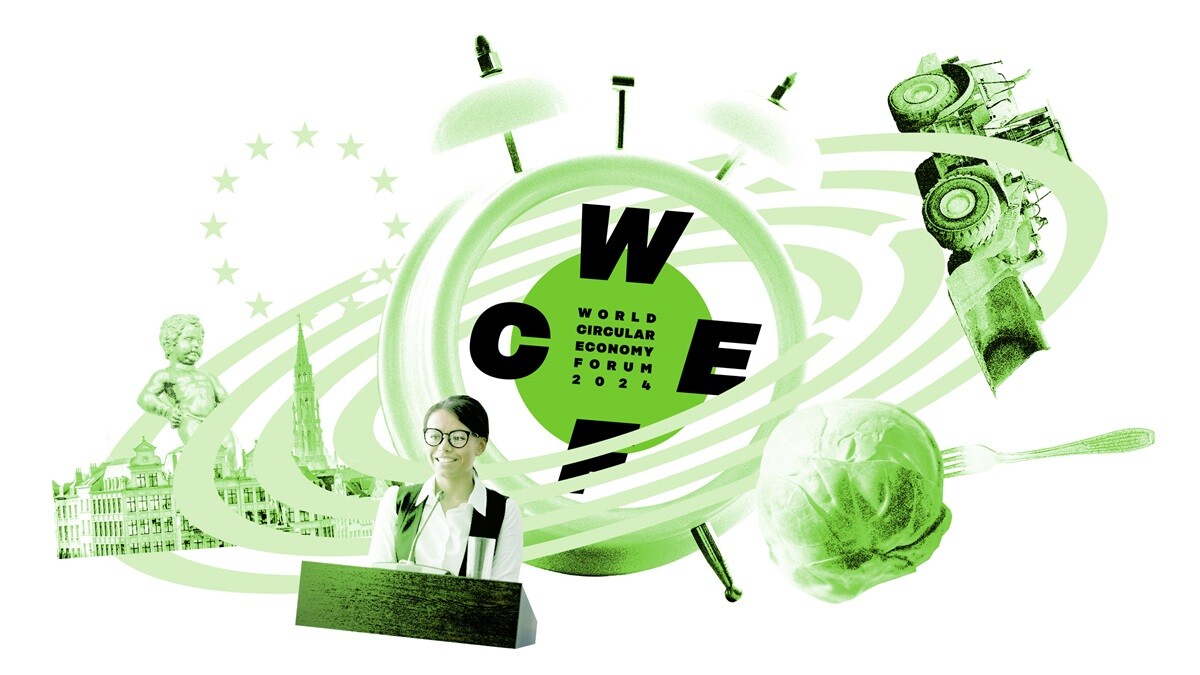News Sustainability Circularity
Adapteo's Takeaways from WCEF 2024: Holding ourselves accountable
- 4 min reading

We’ve just returned from Brussels, where Adapteo took part at the World Circular Economy Forum 2024. Not surprisingly, topics covered transformative discussions on the circular economy, but a profound realization resonated throughout: It’s time to hold everyone accountable—our policymakers, our partners, our suppliers, and ourselves particularly. Food for thought: When it comes to ‘You’— as we’re all inevitably part of someone else’s Scope 3 emissions—can you confidently say you’re proud of the strides you’ve made?
Written by Zoey Tsopela, Head of External Relations, Adapteo Group
Image by Topias Dean, Sitra
A few takeaways that struck a chord with me:
No cherry picking in circular economy
The forum kicked off with a bang, thanks to Hans Bruyninckx, who threw a grenade into the usual “What should we prioritize?” debate. His answer? Everything. Everywhere. All at once. It’s like the universe of environmental solutions exploded in a kaleidoscope of actions we need to tackle simultaneously. The circular economy isn’t a pick-and-choose menu; it’s an ecosystem where every element is interconnected. Just as nature doesn’t prioritize the sun over the rain, we can’t afford to select which environmental solutions to implement. Instead, we must embrace the complexity, recognizing that the vitality of our planet hinges on a multifaceted, omnipresent engagement.
Digging deeper: According to the Ellen MacArthur Foundation, companies that embrace circular economy practices can unlock a global economic opportunity worth $4.5 trillion by 2030, highlighting the vast potential of applying circular principles across all sectors simultaneously. Read more here.
Policy, please!
Our planet’s natural resources are being drained faster than a bar at happy hour. We’re on the hunt for policies, not just any scribbles on paper, but the kind that are robust and reliable, ones that hold us accountable and can spark innovation faster than you can say “circular economy.” And let’s not forget about the financial systems—because what’s the point of a great idea if the money doesn’t flow where it needs to?
Attention to those navigating procurement processes and those crafting our laws: it’s high time we escalate our ambitions. We are pushing hard to bring previously used modules and materials into the bidding arena, but that’s just the starting line. It’s time we champion bold mandates. Let’s inscribe into policy that public infrastructure projects must incorporate a significant percentage of reused materials. After all, the true measure of policy isn’t found in its words, but in its capacity to reinforce the bedrock of our sustainability goals.
Digging deeper: The International Resource Panel reports that coherent policy frameworks that integrate economic, environmental, and social goals can lead to a 70% reduction in carbon emissions by 2050 while bolstering economic growth. Read more here.
Breaking the damn silos (this problem is so outdated already).
Horizontal problem-solving was a major theme. We’re not doing the one-problem-at-a-time march anymore. We’ve seen time and again that silos within corporations do more harm than good, stifling innovation and collaboration. So, why do we still see them in our approach to global sustainability? It’s baffling that in an age where business leaders strive to demolish these barriers, they persist in areas where they can cause the most damage. Yes, we need robust support structures, but let’s be real—we needed them yesterday, not when we’re all long retired. If breaking silos is old news in the corporate world, it’s high time we treat it with the same urgency in our global environmental strategies.
Use what we got
Echoing the Deputy Mayor of Leuven, Thomas van Oppens: it’s about designing for disassembly, reuse, flexibility. We’re surrounded by innovative ideas shackled by conservative habits. Time to break those chains and get everyone on board with circular solutions— let’s redesign business models and rethink value chains—this is the absolute necessity of a regenerative economy.
Building tomorrow today
Let’s talk about the built environment— is a new building necessary? In the sphere where Adapteo shapes its world, buildings aren’t just standing structures; they’re mutable beasts in expanding communities. Circular economy principles dictate that we’re not just erecting monuments to the present — we’re engineering malleable spaces focused on function and value creation, designed for reuse. ‘Space as a Service’ is a commitment to evolution and endurance, with each design decision weighed against its environmental echo.
What we’re tackling is the quick deployment of spaces that can bend, twist, and morph with the times (yes, even build on what is already there). Think Lego blocks on a city scale — snapping together, coming apart, and reassembling without skipping a beat. It’s about more than just using space; it’s about respecting it, ensuring our built environment remains as fluid and forward-thinking as the society itself.
Digging deeper: A study by the World Green Building Council suggests that circularity in buildings can reduce waste output by up to 70%, energy consumption by 50%, and water usage by 40%, demonstrating the substantial impact of integrating sustainability into the built environment. Read more here.
In Conclusion: Marching Towards Progress
This forum wasn’t just another conference where everyone nods and goes home. It was a call to arms, a blueprint for a sustainable future where we don’t just aim for perfection but make significant progress.
As we wrap up, remember circular economy isn’t just a strategy; it’s a necessity. And at Adapteo, we’re not just participants; we’re driving the change. Let’s roll up our sleeves, think outside the box, and push the boundaries of what’s possible. Because when it comes to our planet, good enough just doesn’t cut it.
See you next year in São Paolo, Brazil.